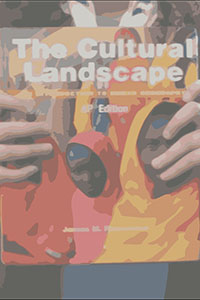Students step up to the rigor of a college level class in their first year of high school

With their grades and potential college credit on the line, every day, second hour, 17 students pile into Room 209, ready for another day of doing something no one else in this school has done. Perhaps unsatisfied with their first semester grade card, or perhaps simply aiming to do better second semester, the students sit at their tables to review the notes they took the night before. This is social sciences teacher Tyler Alexander’s one and only Advanced Placement (AP) Human Geography class.
“I thought it would be interesting,” freshman Crystal Rathburn said. “My eighth grade social studies teacher recommended me for it. When he explained it, he made it really interesting, so he influenced some people to take that class.”
This year, Blue Valley decided to add the first AP class open to freshmen. AP classes, equivalent to college-level courses, allow AP students to take an exam in May. Those who receive a score of a three or higher can get college credit for the course.
Principal Scott Roberts said that all five high schools in the district had to agree to offer the course before the consensus was presented to the Curriculum Instruction Committee and finally the Blue Valley Board of Education for approval.
After discovering that other school districts in the area were already offering the class, Roberts decided that AP Human Geography would be a good choice for the Blue Valley School District to implement.
“You look at AP classes within the full catalog they have [and] AP Human Geography is about the only one that’s really appropriate [for freshmen],” Roberts said. “It just made sense for us. In fact, we’ve been looking at this course for three years; it’s a really great first AP course.”
Alexander said that the class is about everything from agricultural practices to political geography to culture and religion to the way people behave in society and why. As in other AP classes, students complete AP multiple choice questions and free-response questions. The units are broken into key issues that the reading and guided notes elaborate on. In class, students usually participate in activities or case studies to expand on what they read the night before.
Carrying out the class has presented its own difficulties. Both the teacher and the students have struggled with adjusting to the new class, since it’s everyone’s first try.
“Sometimes the background knowledge is hard because [the freshmen] haven’t had all of the other history classes,” Alexander said. “Suppose if we talked about the Renaissance — they don’t have any reference points. The lack of background knowledge is maybe the most difficult part. I think part of it is getting used to, especially for freshmen, what AP means because they don’t know what that looks like.”
Senior Jacob Emery explained that the class is easier for him as a senior than it is for a freshman because of all the background knowledge and AP skills he has acquired from taking other AP classes.
Even though the class may be more manageable for students with experience in AP classes, Rathburn said that for freshmen, the class is a big transition amidst a new school and setting.
“There were a lot of terms that nobody understood or knew,” Rathburn said. “For tests, there was a lot of writing and multiple choice, and that was difficult for a first time because it was on a different grading scale. You had all the information to study, but there was a lot of it, so you didn’t know what to study.”
Rathburn said that students were intimidated to be the guinea pigs of a new AP class. Unable to get advice from anyone who had previously taken the class, Rathburn said the freshmen didn’t know what to expect.
“[The other freshmen] probably were scared to try it out,” Rathburn said. “It was a big step going into [the class and going into] high school. I thought it was going to be a lot harder than it was, but now that I have gotten used to it, it’s gotten a lot easier.”
Despite the debate that an AP class for a freshman is too difficult, Alexander and Roberts thought it was a good addition. AP Human Geography serves not only as another rigorous class, but also a stepping stone for students looking to go into other AP classes.
“[AP Human Geography has] just what it takes for work and the study component and what it means to be prepared for class and be engaged and discuss and participate,” Alexander said. “I think that’s a good challenge for students to get in right when they come into high school — to have that become the norm. It’s a really good opportunity for them to develop AP skills. If you’re prepared to be challenged, then I’d say it’s a good fit.”
Though many students choose to take an AP class simply to challenge themselves and look good on college applications, others simply follow their passion.
“I like history, and it was another AP course,” Emery said. “If I would’ve taken this class as a freshman, it would’ve prepared me better for AP Euro and APUSH.”
Whether it’s passion or prestige that guides someone to take an AP class, Roberts said alumni claim that the AP experience made them more prepared for college.
“It is my belief that anyone who wants to go straight from high school to a four year school should take at least one AP class,” Roberts said. “[The classes] were tough but the [AP students] were ready. And that’s that push we have. We don’t want you to be just college-eligible — we want you to be college-ready. That really validates why we have these AP classes. Taking the class is great, but preparing and taking the test is the most college-like thing we can offer you in high school.”

This is Sneha's first year on staff. Sneha is a junior taking way too many hard classes. She's an overachiever who actually enjoys school (sometimes)....

